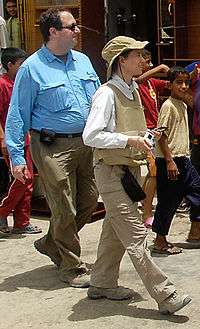Frederick Kagan
| Frederick Kagan | |
|---|---|
|
Frederick and Kimberly Kagan touring Basra in 2008. | |
| Born | March 26, 1970 |
| Nationality | American |
| Education | PhD in Russian and Soviet military history |
| Alma mater | Yale University |
| Occupation | Resident Scholar |
| Employer | American Enterprise Institute |
| Spouse(s) | Kimberly Kagan |
| Parent(s) | Donald Kagan |
| Relatives | Robert Kagan, brother |
Frederick W. Kagan is an American resident scholar at the American Enterprise Institute (AEI), and a former professor of military history at the U.S. Military Academy at West Point.
Biography
Kagan graduated from Hamden High School before earning a B.A. in Soviet and East European studies and a Ph.D. in Russian and Soviet military history, both from Yale University. He worked as an Assistant professor of military history at West Point from 1995–2001 and as an Associate professor of military history from 2001–2005. The courses he taught at West Point included the history of military art, grand strategy, revolutionary warfare and diplomatic history.
Kagan's brother is foreign policy analyst Robert Kagan, whose wife is Victoria Nuland, Assistant Secretary of State for European and Eurasian Affairs. Frederick Kagan is married to Kimberly Kagan, president of the Institute for the Study of War.
Frederick Kagan and his father Donald Kagan, who is a professor at Yale and a fellow at the Hudson Institute, together authored While America Sleeps: Self-Delusion, Military Weakness, and the Threat to Peace Today (2000). The book argued in favor of a large increase in military spending and warned of future threats, including from a potential revival of Iraq's WMD program.[1] Frederick along with his brother Robert Kagan, who is a member of the Aspen Strategy Group, and their father Donald, are all signatories to the Project for the New American Century manifesto titled Rebuilding America's Defenses (2000).[2]
Influence
Kagan authored the "real Iraq Study Group" report as the AEI's rival to the ISG report of James Baker and Lee H. Hamilton in December 2006. The AEI report, titled Choosing Victory: A Plan for Success in Iraq, was released on January 5, 2007, and Kagan was said to have won-over the ear of President George W. Bush,[3] strongly influencing his subsequent "surge" plan for changing the course of the Iraq War. Along with retired Gen. Jack Keane, retired Col. Joel Armstrong, and retired Maj. Daniel Dwyer, Kagan is credited as one of the "intellectual architects" of the surge plan.[4] According to Foreign Policy magazine, Kagan's essay, "We're Not the Soviets in Afghanistan," influenced the strategic thinking of Secretary of Defense Robert Gates, that reportedly influenced Gates' decision to support sending 30,000 additional troops to Afghanistan.[5]
Petraeus
In 2010, U.S. Army General David H. Petraeus – appointed by President Barack Obama to head international forces in Afghanistan – hired Kagan as one of two experts on fighting corruption.[6] An article in the Washington Post on 19 December 2012 discussed the relationship that the Kagans had with General Petraeus, and to a much lesser extent with his successor in July 2011, Gen John R. Allen. It discussed various visits made by the Kagans from mid-2010 including their having been given access to the Combined Joint Intelligence Operations Center in Petraeus' headquarters. It commented on and raised questions about their sponsorship by Defense contractors through the American Enterprise Institute. It also detailed how the Kagans had become involved in Iraq in 2007 under an initiative by Gen. Stanley A. McChrystal, who was their first introduction to Afghanistan in 2010.[7]
Bibliography
- The military history of the Soviet Union. Palgrave. 2002. ISBN 0-312-29398-4. OCLC 49046824. edited with Robin Higham
- The end of the old order: Napoleon and Europe, 1801–1805. Da Capo Books. 2006. ISBN 0-306-81137-5. OCLC 70714210.
- Finding the target: the transformation of American military policy. Encounter Books. 2006. ISBN 1-594-03150-9. OCLC 67375072.
- Ground truth: the future of U.S. land power. AEI Press. 2008. ISBN 0-844-74262-7. OCLC 213765941.with Thomas Donnelly
- Lessons for a long war: how America can win on new battlefields. AEI Press. 2010. ISBN 0-844-74284-8. OCLC 318421296. edited with Thomas Donnelly
References
- ↑ Kennicott, Philip (2005-05-13). "Yale Historian Donald Kagan, Mixing the Old And the Neo". Washington Post. Retrieved 2007-01-19.
- ↑ Donnelly, Thomas; et al. (September 2000). "Rebuilding America's Defenses: Strategy, Forces and Resources for a New American Century" (PDF). Project for the New American Century. p. 78. Retrieved 2007-01-19.
- ↑ Benjamin, Mark (2007-01-06). "The real Iraq Study Group". salon.com. Retrieved 2007-01-19.
- ↑ Beinart, Peter (2007-01-18). "Bush's 'surge' could deep-six McCain's 2008 presidential hopes". The Free Lance—Star. Retrieved 2007-01-19.
- ↑ Kaplan, Fred (2010-09-01). "The Transformer". Foreign Policy. Retrieved 2010-08-17.
- ↑ Laura King and Paul Richter, U.S. sends warning to Afghanistan, and John Kerry delivers the message, Los Angeles Times, August 18, 2010.
- ↑ Civilian analysts gained Petraeus's ear while he was commander in Afghanistan, Rajiv Chandrasekaran, Washington Post, 19 December 2012, accessed 20 December 2012
External links
- AEI profile
- Rebuilding America's Defenses (2000)
- "PBS NewsHour": "As Violence Peaks and Dips, Debate Over 'Surge' Persists" (March 11, 2008) Kagan, an architect of the Iraq "surge" strategy, debates the outcome of that strategy with journalist Nir Rosen.
- Appearances on C-SPAN
|
